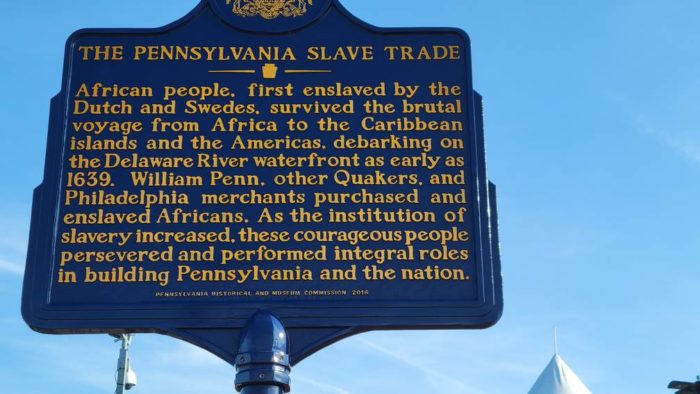The Pennsylvania Historical Commission’s odd blunder on the history of slavery
Look at the start of this sign I saw at Penn’s Landing after my fundraising bike ride: “African people, first enslaved by the Dutch and Swedes, . . . “. Is there some way to read that sentence that reflects history? Slavery has existed in many cultures since before Holland and Sweden existed, including Africa.

Quoting Wikipedia’s Slavery in Africa page, slavery in Africa predates the existence of Holland and Sweden by millennia.
Slavery in northern Africa dates back to ancient Egypt. The New Kingdom (1558–1080 BC) brought in large numbers of slaves as prisoners of war up the Nile valley and used them for domestic and supervised labour.[53][54] Ptolemaic Egypt (305 BC–30 BC) used both land and sea routes to bring slaves in.[55][56]
Chattel slavery had been legal and widespread throughout North Africa when the region was controlled by the Roman Empire (145 BC – ca. 430 AD), and by the Eastern Romans from 533 to 695).[58] A slave trade bringing Saharans through the desert to North Africa,[59] which existed in Roman times, continued and documentary evidence in the Nile Valley shows it to have been regulated there by treaty.[22] As the Roman republic expanded, it enslaved defeated enemies and Roman conquests in Africa were no exception.[60] For example, Orosius records that Rome enslaved 27,000 people from North Africa in 256 BC.[61] Piracy became an important source of slaves for the Roman Empire and in the 5th century AD pirates would raid coastal North African villages and enslave the captured.[62] Chattel slavery persisted after the fall of the Roman Empire in the largely Christian communities of the region.[63] After the Islamic expansion into most of the region because of the trade expansion across the Sahara,[64] the practices continued and eventually, the assimilative form of slavery spread to major societies on the southern end of the Sahara (such as Mali, Songhai, and Ghana).[65][4] The medieval slave trade in Europe was mainly to the East and South: the Christian Byzantine Empire and the Muslim World were the destinations, Central and Eastern Europe an important source of slaves.[66][67] Slavery in medieval Europe was so widespread that the Roman Catholic Church repeatedly prohibited it—or at least the export of Christian slaves to non-Christian lands was prohibited at, for example, the Council of Koblenz in 922, the Council of London in 1102, and the Council of Armagh in 1171.[68] The slave trade was carried out in parts of Europe by Iberian Jews (known as Radhanites) who were able to transfer slaves from pagan Central Europe through Christian Western Europe to Muslim countries in Al-Andalus and Africa.[69][70]
I’m not questioning slavery or its cruelty nor implying Dutch or Swede innocence. For this sign to open with such an egregious, simple-to-verify error calls to question how it could happen. Who wrote the sign? Who approved it? It does no service to anyone to erase thousands of years of slavery.
Then why call out, of all groups, Quakers, as owning slaves? Why not, based on the paragraphs above, Romans, Muslims, other Africans, Jews, or pagans?
The page continues, stating that many slaves in North Africa before the year the sign mentioned, 1639, were European Christians, for all we know including Dutch and Swedes.
Such observations, across the late 1500s and early 1600s observers, estimate that around 35,000 European Christian slaves held throughout this period on the Barbary Coast, across Tripoli, Tunis, but mostly in Algiers.[82] The majority were sailors (particularly those who were English), taken with their ships, but others were fishermen and coastal villagers. However, most of these captives were people from lands close to Africa, particularly Spain and Italy.[83]
I’m not saying the numbers were comparable and I have no idea if the practices were similar or different, but why call out Quakers of all the groups practicing and profiting from slavery? Why leave out thousands of years of many cultures enslaving people in Africa?
Read my weekly newsletter

On initiative, leadership, the environment, and burpees
3 responses on “The Pennsylvania Historical Commission’s odd blunder on the history of slavery”